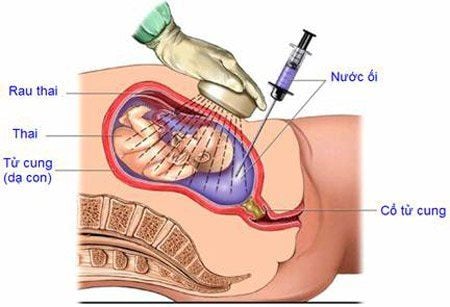This is an automatically translated article.
Amniotic fluid infection is a bacterial infection that occurs before or during labor. The bacteria enter the amniotic membrane, amniotic fluid and fetus, which can cause dangerous complications for both mother and baby. This article provides essential information about amniotic fluid infection.
1. What is an infection of the amniotic fluid?
Amniotic fluid infection is a bacterial infection that occurs before or during labor. The name refers to the membranes that surround the fetus: the "amniotic membrane" and the "amnion" (a fluid-filled sac).
This condition occurs when bacteria infect the chorion, amniotic membrane, and amniotic fluid surrounding the fetus. It can lead to premature birth or serious infections for mother and baby. It is most commonly seen in premature births; it is also seen in about 2 to 4 percent of full-term deliveries.
Infection of the amniotic fluid is also known as “amniotitis” or “infection within the amniotic membrane”.
2. What causes amniotic infection?
This condition often develops as a result of an infection that can occur when bacteria normally present in the vagina get into the uterus, where the fetus is located.
E. coli , group B streptococcus and anaerobic bacteria are the most common causes of amniotic infection.
Amniotic fluid, placenta and baby can become infected.

E.coli là một trong những nguyên nhân phổ biến nhất của bệnh nhiễm trùng ối
3. What are the symptoms of an amniotic infection?
Infection of the amniotic fluid does not always cause symptoms, but some women may experience:
Fever Fast fetal heartbeat Painful uterus Discolored, foul-smelling amniotic fluid
4. Risk factors for amniotic fluid infection
The most common risk factors for this condition include:
Young maternal age (under 21) Low socioeconomic status First time pregnancy Long-term labor Breaking of membranes (amniotic fluid leak) during a long period of time Preterm birth Repeated vaginal examination during labor (only one risk factor in women with broken membranes) Pre-existing lower genital tract infection Fetal heart monitoring electrodes during Uterus If you have one or more of these risk factors, you may be more likely to get amniotic fluid infection.
5. Complications of amniotic fluid infection
Infection of the amniotic fluid is generally considered a medical emergency. This condition can lead to serious complications, including:
Sepsis (infection in the blood) Endometritis (infection in the lining of the uterus) Requires cesarean section Major blood loss during delivery Thrombosis in the lungs and pelvis About 3 to 12% of women with amniotic fluid infection have sepsis. This condition also increases the need for a cesarean section. Among those who have a cesarean section, up to 8% have a surgical site infection and about 1% have a pelvic abscess (a collection of pus). Maternal death from infection is extremely rare.
Babies born to mothers with sepsis are also at risk for serious complications:
This condition can lead to meningitis (infection of the brain and spinal cord). However, this occurs in less than 1 percent of full-term babies. Pneumonia or sepsis can also develop in about 5 to 10 percent of babies born to women with amniotic infections. Sepsis is more common in premature infants. In rare cases, complications related to an infection of the amniotic fluid can be life-threatening for a premature baby. These complications are less likely if the infection is diagnosed early and treatment with antibiotics is started.
6. How is amniotic infection diagnosed?
Your doctor can usually diagnose this condition by doing a physical exam. Lab tests can confirm that diagnosis.
Amniocentesis may be necessary if you are in preterm labor. In this prenatal test, a small amount of amniotic fluid is removed for testing. You can get amniotic fluid if your amniotic fluid has low levels of glucose (sugar) and high levels of white blood cells (WBCs) and bacteria.

Chọc ối có thể cần thiết nếu bạn đang chuyển dạ sinh non
7. How is an infection of the amniotic fluid treated?
Once you are diagnosed with amniotic fluid infection, you will receive immediate treatment to prevent complications.
Early treatment can lower fever, shorten recovery time, and reduce your child's risk of infection and complications.
Antibiotics are often used to treat this condition. They are usually given through an IV and are continued until you give birth. Some of the following antibiotics you may receive:
Ampicillin (Principen) Penicillin (penvk) Gentamicin (Garamycin) Clindamycin (Cleocin) Metronidazole (Flagyl) When the infection is responding to treatment, your doctor will stop taking it. use antibiotics. You should be able to leave the hospital once your fever is gone and your doctor thinks you can go home safely.
Most people do not need outpatient oral antibiotics.
8. What is the long-term prognosis for people with amniotic fluid infection?
The long-term prognosis for mothers with amniotic fluid infection is excellent. Future fertility is rarely compromised.
The outlook for infants delivered to infected mothers is also very good.
But some babies, especially premature babies, can have long-term complications. These complications may include lung disease or impaired brain function.
9. How can amniotic fluid infection be prevented?
Your doctor will do his best to prevent an infection from developing in the first place. They can do this in a number of ways, such as:
Screening you for a bacterial vaginal infection ( vaginitis ) in your second trimester Screening you for a strep infection group B when you are 35 to 37 weeks of pregnancy Reduce the number of vaginal exams during labor Minimize the frequency of use of an internal fetal heart monitor It is important that you have regular check-ups with your doctor and address your questions and concerns.
To ensure the best health of pregnant women and fetuses, you should choose to register for all-inclusive Maternity packages at reputable medical facilities to be regularly examined and monitored by doctors for treatment. timely arising and risks occurring during pregnancy and after labor.
At Vinmec International General Hospital, there is a package maternity service as a solution to help pregnant women feel secure because of the companionship of the medical team throughout the pregnancy. When choosing Maternity Package, pregnant women can:
The pregnancy process is monitored by a team of highly qualified doctors Regular check-ups, early detection of abnormalities The package pregnancy helps to facilitate convenient for the birthing process Newborns get comprehensive care
Please dial HOTLINE for more information or register for an appointment HERE. Download MyVinmec app to make appointments faster and to manage your bookings easily.
Reference source: healthline.com













